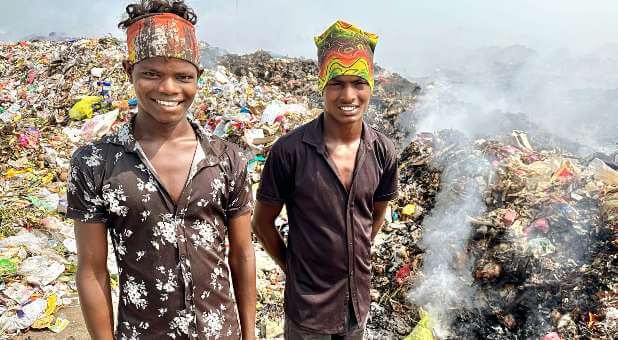Last month I accompanied my friend Prasanna to a huge garbage dump on the edge of the city where he lives in Andhra Pradesh in southeast India. For the past few years Prasanna, his older brother, Raja, and their ministry team have been taking food, medicines, clothes and other aid to a growing group of homeless people who live in tents on the edge of the dump.
I’ve seen some awful poverty during my previous trips to India, so I wasn’t shocked when I drove with Prasanna to this makeshift village constructed from cardboard boxes, tattered blankets, wooden crates and discarded metal. But I didn’t expect to see so many small children in this dreadful place. Many of them didn’t have any clothes. They all looked malnourished.
Then I met Kodayya and Kalyan, two teenage boys who spend their days scrounging through the massive piles of trash looking for plastic bottles to recycle. On most days, many younger children also work in the dump. They wear cloth masks to protect themselves from the toxic fumes billowing from the smoldering garbage, but I knew the masks were useless.
The worst part of the experience was the smell. I immediately started breathing through my mouth when I arrived at the dump because the noxious mixture of burning trash, rotten food and chemical fumes was nauseating. And yet we were able to distribute clean blankets, bags of groceries and some toys to several of the families who have made this squalor their home.
The saddest aspect of this scenario is that the people living in the dump are Dalits, also known as “untouchables” in Indian culture. These people have been taught that they have no right to human dignity. Many Hindus believe that Dalits are at the bottom of the caste system and that they are being punished by the gods because of the mistakes they made in past lives.
And yet God is working in this horrible garbage dump. Prasanna and his Christian friends don’t believe anyone is untouchable. When they bring food, they also offer hugs and smiles, and they sometimes lay hands on sick people and pray for healing. Prasanna has also started doing Bible studies with Kodayya and Kalyan even though they are illiterate.
When I travel to Andhra Pradesh, or any other place in the world where severe poverty is the norm, I always get a spiritual reset. I’m reminded that I live in a bubble in the United States, and that the majority of the world’s people don’t have even a fraction of the material blessings I do.
Every Thanksgiving I try to remember how most of the world lives, outside of my comfort zone. Please consider that the blessings you experience every day are very different from reality in other parts of the world.
— Do you have a roof over your head? One in 3 children in the world live without adequate shelter.
— Do you drink clean water? About 9 million people will die this year because of water-related illnesses. And millions of women around the world spend an average of four hours daily walking to get water.
— Do you enjoy three meals a day? Approximately 925 million people in the developing world are chronically undernourished.
Sign up NOW for a FREE Charisma Magazine Online 30-day trial!
— Do you have a flushable toilet? The United Nations Development Program reports that 2.6 billion people do not have access to any toilet facilities.
— Do you own shoes? About 2 billion people worldwide are currently plagued with parasitic diseases that could be prevented simply by wearing proper footwear.
— Can you read? Nearly a billion people in the world can’t read a book or sign their names.
— Do you own a car? Globally, only 1 out of every 8 people has access to a car. Many of the others either walk, take crowded buses or public vans or ride on bicycles, rickshaws or animals.
— Do you have a college degree? You are in a privileged minority, because only 6.7% of people in the world have a college diploma.
— Did you live past age five? Some 21,000 children die every day around the world because of poverty and preventable diseases. That is equivalent to one child dying every four seconds.
Please let reality set in. You are blessed! David wrote: “Bless the Lord, O my soul, and forget not all His benefits” (Ps. 103:2a). You don’t have to visit a garbage dump in India to be reminded of how blessed you are. Let Thanksgiving recalibrate your heart and adjust any whiny attitudes. Look around, count your blessings and thank God for all the ways He has been good to you.
Join Charisma Magazine Online to follow everything the Holy Spirit is doing around the world!












































